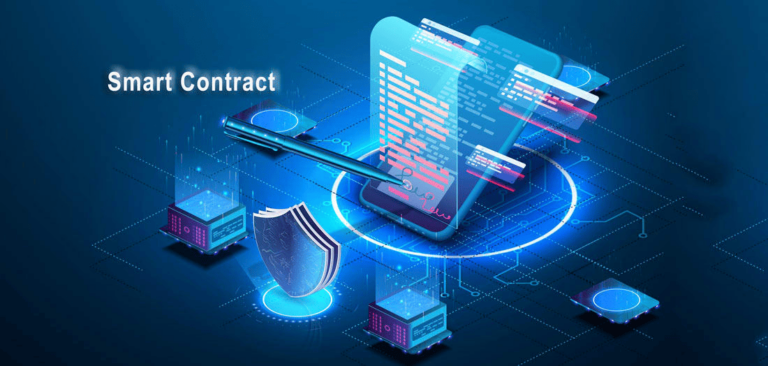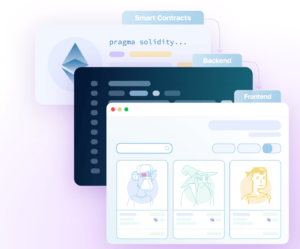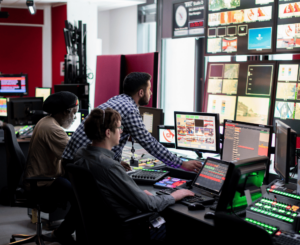In the current financial world, top-notch technology solutions are high in demand for every type of transaction. Cryptocurrency, for example, is a significant player nowadays and is also the one that runs blockchain development.
If you want to become fluent with blockchain or maybe you want to start your own blockchain app company you should first understand basic fundamentals of top programming languages.
Before we can understand programming languages for blockchain, we need to understand what is a decentralized application. A decentralized application has two major parts: 1 the front end and 2 the smart contracts.
We cover this and more as we break down the top blockchain coding languages used in development.
Table of Contents
Front – End Programming Languages
The first is the front end. Blockchain developers build a web page that you see in a browser like a regular website. The other part is the smart contract. That’s a small program inside the blockchain. So we want to have these two parts.
The Smart Contract Programming Language
For the smart contract, we have the front end of a decentralized application. The front end is a regular web page, so it uses all the standard web technology. HTML is for the structure of the page CSS for styling and JavaScript for the dynamic nature of the page. Actually, in some cases, you not only have a front end in a smart contract but also a back end new decentralized application.
Pareto’s Law of 80/20
80% of the most popular programming languages are the usual languages such as JavaScript, Python, Java, C-Sharp, and C++. There are other object-oriented features in other software, however the above are the basic fundamentals.
20% of blockchain projects are of Solidity, Simplicity, Rust, Moralis, NodeJS, Remix, Truffle, Ganache, HardHat, and Golang.
For Example, 80% of a blockchain project is built in JavaScript and the rest of the 20% is built in smart contract software such as Solidity or Rust.
80%: JavaScript, Python, Java, C-Sharp, C++
JavaScript
You’re definitely going to need Javascript as it could be the best programming language for most projects, so it’s just a no-brainer to learn it for blockchain technology. JavaScript is probably the most popular programming language and maybe the best.
Python
One of the most popular by far. If you’re a new developer experienced in python then it might be the best blockchain technology for you. Python is an open-source interpreted program and also has huge open-source support which makes it ideal for blockchain development. There are many python libraries, plugins, and other resources available online for almost every problem you can encounter in blockchain development.
Java
Java is one of the usual programming languages for blockchain projects. It is a great programming language in the blockchain industry as well as a popular web language in the tech world. It is good and could be the most popular web language.
C Sharp (C#) and C++
C-Sharp is similar to Java and C++ so it is ideal for building blockchains. While C-Sharp was initially created only as a Microsoft language it is now quite popular and considered one of the best for blockchain.
Open source developers can easily create high-level portable code, function overloading, and object-oriented features using C-Sharp that will run across all devices and multiple operating systems such as Windows, Linux, Mac, and Android.
Since C-Sharp is an object-oriented programming language blockchain developers can obtain maximum performance when developing their next blockchain.
The Bitcoin blockchain is written in an open-source programming language C++. In fact, C++ is so popular with blockchain as bitcoin which is a cryptocurrency and the first ever implementation of blockchain was initially written in C++.
The best specification of C++ is the ability to use it to manage resource-intensive apps smoothly. Many developers use C++ to create 3d games in terms of programming compiled language.
20%: Blockchain Programming Language For Blockchain Development

Go
Financial technology giants such as Google, Meta, Uber, and many more are using Go. This software can scale things and is being used by third-generation blockchains such as Cosmos.
Solidity
Solidity could be the best new blockchain programming language. It is built specifically for creating smart contracts because it handles security issues differently.
Solidity is a statically-typed language designed for developing smart contracts that run on Ethereum. It is a blockchain coding language that has a syntax similar to JavaScript but actually, it’s quite different from the JavaScript runtime environment.
It just looks similar from the surface but it’s actually very different. For writing smart contracts it could be the best. However, here are more of the best blockchain programming languages.
The application logic for blockchain solutions has different data structures for creative blockchain applications. Blockchain communities hire blockchain developers in this new arena for blockchain app development.
Simplicity
This could be the best blockchain programming language. Other smart contract development languages such as Simplicity is a high-level blockchain implementation language that was created for smart contracts.
In fact, it is one of the best programming languages to write smart contracts both for professional programmers and open-source developers.
Simplicity is also focused on reducing the complex and low-level understanding of the Bitcoin script. Since it hides the low-level logical components from bit screen developers simplicity increased the work capacity of developers which helps to create a much faster development period.
So blockchain developers building side chains on elements can also use many functions and features of simplicity.
Rust
A good programming language for blockchain development is Rust which is the fastest-growing on the trend line and the most loved language of all. It’s also used for Solana web 3 primitive control programming so I see a lot of people talking about rust because it’s really up-and-coming.
Moralis
Other programming languages such as Moralis a promising web3 development platform that offers a user needs to create, launch and grow great decentralized applications (dapps) in one place. It can make and deploy dapps on Ethereum, BNB, Polygon, Avalanche, Fantom, and smart contracts.
NodeJS
With NodeJS for example web 3 the library integrates with the blockchain this is a JavaScript library that can work as well on the front end and on the back end with NodeJS.
Remix
Another blockchain language is Remix which allows the developing, deploying, and administering of intelligent contracts for Ethereum-like blockchains. It can also be used as a learning platform and you can start coding online. Blockchain certification training can be found at the Project Management Institute.
Truffle
The Truffle Suite gets developers from software development to dapp as comfortably as possible. It also acts like an asset pipeline for blockchains using the Ethereum Virtual Machine (EVM)
Ganache and Hardhat
Ganache has a functional approach that you can quickly fire up a personal Ethereum blockchain which you can use to run tests, execute commands, and inspect state while controlling how the chain operates.
Different programming languages handle security issues differently on cryptographic chains that many blockchain developers use in the blockchain world.
A new blockchain tool is the Hardhat Network which is a local Ethereum network designed for development. Hardhat is used for Solidity debugging.
You get Solidity stack traces, console.log, and explicit error messages when transactions fail. It is possible to build a blockchain project from scratch using this open-source software supported by Google.
The Bottom Line
80% of a blockchain project is built using the top 5 software such as Javascript or Python and the rest of the 20% is built in Solidity, Rust, or the other languages mentioned.






